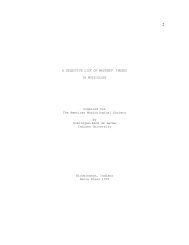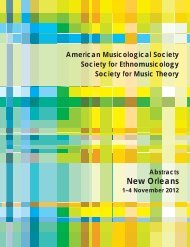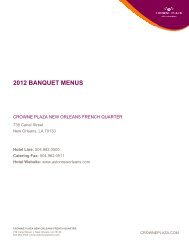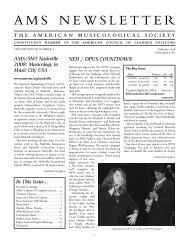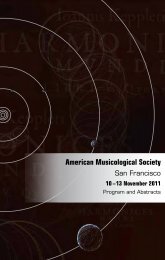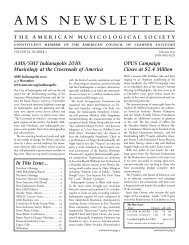AMS Philadelphia 2009 Abstracts - American Musicological Society
AMS Philadelphia 2009 Abstracts - American Musicological Society
AMS Philadelphia 2009 Abstracts - American Musicological Society
You also want an ePaper? Increase the reach of your titles
YUMPU automatically turns print PDFs into web optimized ePapers that Google loves.
176 sunday morning <strong>AMS</strong> <strong>Philadelphia</strong> <strong>2009</strong><br />
SALVe regiNA/SALVe rex CHriSte: THE LUTHERAN<br />
APPROPRIATION OF THE MARIAN ANTIPHONS IN<br />
THE ERA OF NEW PIETY (NEUE FRöMMIGKEIT)<br />
Mary E. Frandsen<br />
University of Notre Dame<br />
Between c. 1640 and 1700, musical settings of the four Marian antiphons, particularly the<br />
Salve regina, with texts that had been “de-Marianized” and re-addressed to Christ, assumed a<br />
significant presence in the Lutheran repertoire. While the practice of altering these supplicatory<br />
Marian texts to bring them into conformity with the Lutheran view of Christ as the sole<br />
mediator dates back at least to Seybald Heyden’s 1523 revision of the Salve regina (as Salve Jesu<br />
Christe, rex misericordiae), and altered texts circulated in northern hymnals into the 1560s,<br />
the most intense Lutheran engagement with these antiphons, albeit in modified form, occurred<br />
more than a century after the Reformation. In the context of a larger study on music<br />
and Lutheran devotion, I have identified nearly eighty such works, both extant and lost. The<br />
vast majority of these are revisions of the Salve regina, which required substitute phrases in<br />
just four lines, while the other three texts necessitated extensive rewriting. Examples appear<br />
in anthologies of Italian music published for the Lutheran market by Ambrosius Profe (1641,<br />
1646, 1649) and Johann Havemann (1659), in Matthias Weckmann’s manuscript anthology<br />
of sacred vocal music, Lüneburg KN 206 (c. 1647), in the Düben, Grimma, Luckau, and<br />
Bokemeyer collections, and in numerous inventories of lost collections (where they may often<br />
be identified through their title incipits). The majority of these de-Marianized pieces are<br />
motets and sacred concertos by seventeenth-century Italian Catholic composers, beginning<br />
with Monteverdi and Grandi, but a few settings of the revised texts by Lutherans (such as<br />
Capricornus) also appear.<br />
At first glance, this appropriation of settings of such cherished Catholic texts smacks of<br />
confessional politics, and suggests that Lutherans sought to present these de-Marianized pieces<br />
in public liturgies as assertions of doctrinal superiority. I will argue, however, that these<br />
works have far more to do with Lutheran spirituality than with confessionalism. As I will<br />
show, they appear as part of the musical response to a development in seventeenth-century<br />
Lutheran spiritual life known to church historians as “new piety” (neue Frömmigkeit), which<br />
was marked by the cultivation of an intense life of prayer and meditation as well as a mystically-infused<br />
devotion to Christ. During the era of new piety (c. 1620–1680), Lutherans authored<br />
hundreds of devotional manuals, prayer books, sermons, and new hymns, and also developed<br />
a considerable body of sacred art music with Christocentric devotional texts—some 700 to<br />
800 pieces—much of which they borrowed directly (without textual intervention) from the<br />
contemporary Catholic repertoire. Thus it seems that Lutherans of this era employed these<br />
de-Marianized pieces—indeed, sought them out—chiefly as musically-rendered prayers of<br />
supplication to Christ. In the broader devotional repertoire cultivated by Lutherans, these<br />
pieces offered a contrast with the settings of rapturous expressions of adoration for Christ and<br />
ardent appeals for mystical union with Him that the Lutherans also prized.



